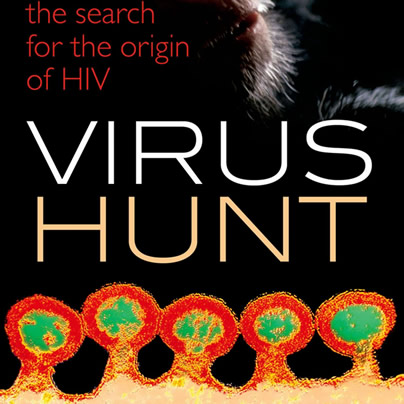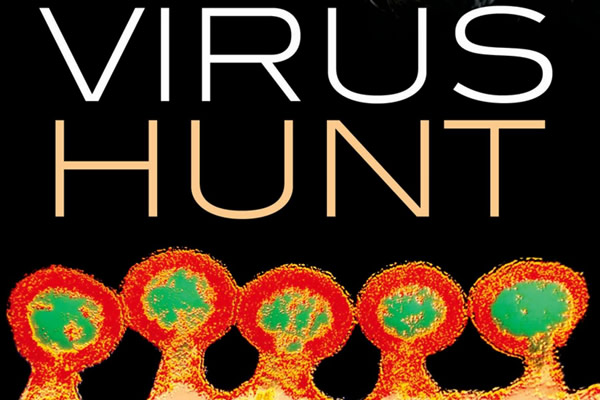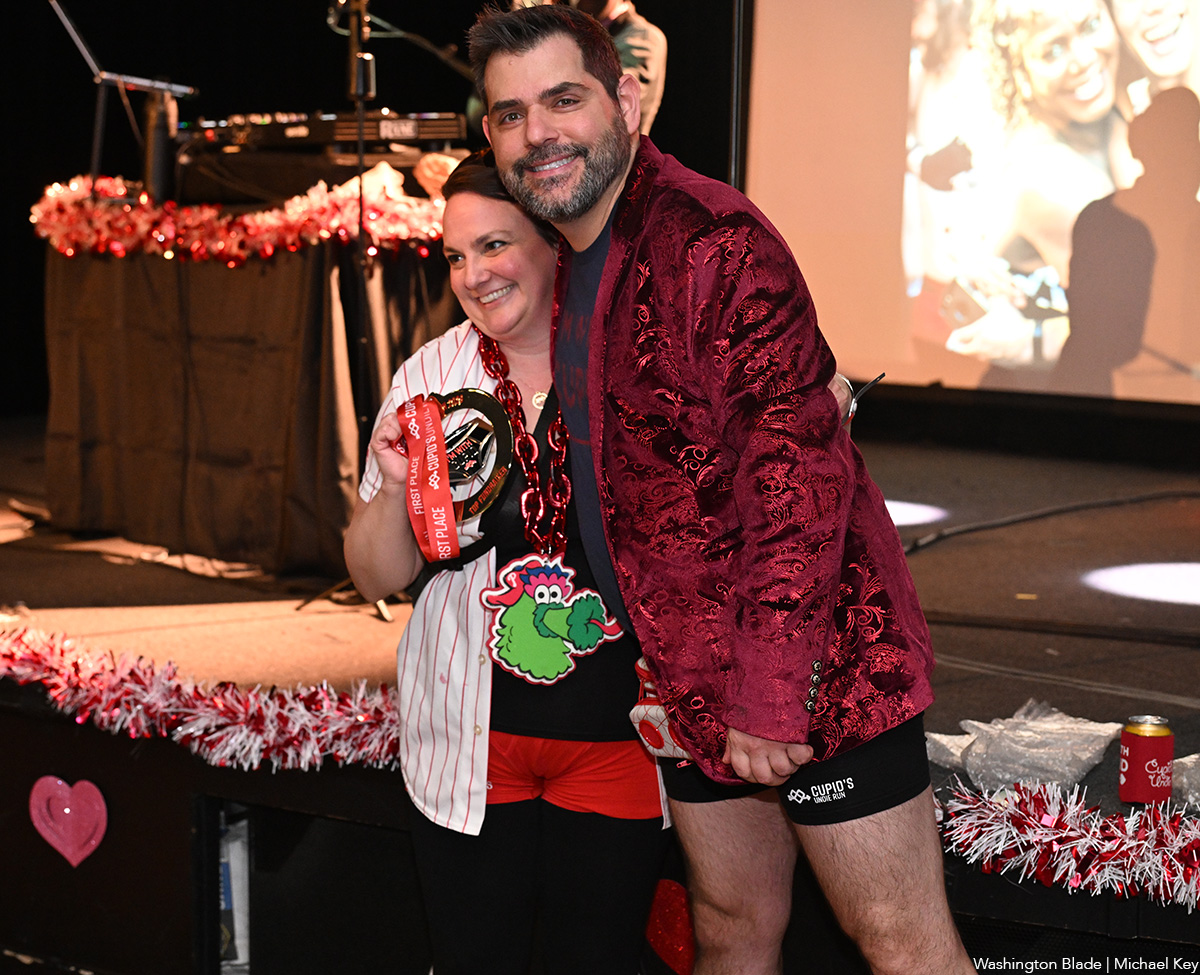Arts & Entertainment
Origins of an epidemic
New HIV book well researched but academic and heavy


‘Virus Hunt’ by Dorothy H. Crawford. (Image courtesy Oxford University Press)
‘Virus Hunt: The Search for the Origin of HIV’
By Dorothy H. Crawford
Oxford University Press
$27.95
244 pages
Some things are easy to track down. Others take years, even decades.
In the new book “Virus Hunt” by Dorothy H. Crawford, you’ll see how scientists discovered the roots of HIV.
In 1981, doctors in California began noticing “rare infections … and an unusually aggressive tumor” in certain patients. Soon, the same was reported in New York, Florida and elsewhere around the country. By 1982, the disease was called AIDS.
The risk of catching AIDS seemed at first to be limited to sexually active gay men, particularly those with multiple partners. Within weeks, heroin users and hemophiliacs were added to the at-risk group, then doctors discovered that infected mothers could pass it to their children. “Fear of AIDS” became “a disease in its own right.”
By 1984, the “causative virus was identified [as human immunodeficiency virus]… and shortly thereafter the genome was sequenced …”
But where did HIV come from?
Soon after the first description of AIDS was released in 1981, Boston researchers noticed that their captive macaque population was affected with something that sounded similar. Four years later, scientists at that research facility isolated a simian immunodeficiency virus (SIV) that had spread and mutated as animals were “unwittingly” shipped around to other facilities.
That led to the discovery that some SIVs are “closely related” to certain strains of HIV and share “between 62 and 87 percent” of their genetic sequences. It didn’t take much to see how the virus mutated, or how it leaped from animal to human, possibly via Africa’s sooty mangabey monkeys (a “natural host of the virus”), which were sometimes hunted for food.
But the question of where HIV came from needs to go back even further than 1981. A man from Memphis experienced AIDS-like symptoms back in 1952. SIVs were discovered in Icelandic sheep in 1949. Scientists, in fact, believe that SIVs are “ancient parasites” and that HIV has been “circulating in the African population since near the start of the 20th century.”
At the beginning of this book, author Dorothy H. Crawford indicates that the search for the beginnings of HIV is somewhat like a mystery. She’s absolutely correct. It is, but you need a Sherlockian PhD to understand it all.
That’s not to say that “Virus Hunt” is a bad book — that’s not the case at all. What readers will want to know, however, is that it’s very academic and heavily steeped in genetics, epidemiology and laboratory-level research. That’s great for anyone employed in those fields. For the layperson, this mystery’s not unreadable but it’s as far from relaxing entertainment as you’ll ever get.
Tackle this book, therefore, but give yourself some time to absorb it. Without that kind of consideration and careful contemplation, “Virus Hunt” will be hard to appreciate.
Theater
José Zayas brings ‘The House of Bernarda Alba’ to GALA Hispanic Theatre
Gay Spanish playwright Federico García Lorca wrote masterpiece before 1936 execution

‘The House of Bernarda Alba’
Through March 1
GALA Hispanic Theatre
3333 14th St., N.W.
$27-$52
Galatheatre.org
In Federico García Lorca’s “The House of Bernarda Alba,” now at GALA Hispanic Theatre in Columbia Heights, an impossibly oppressive domestic situation serves, in short, as an allegory for the repressive, patriarchal, and fascist atmosphere of 1930s Spain
The gay playwright completed his final and arguably best work in 1936, just months before he was executed by a right-wing firing squad. “Bernarda Alba” is set in the same year, sometime during a hot summer in rural Andalusia, the heart of “España profunda” (the deep Spain), where traditions are deeply rooted and mores seldom challenged.
At Bernarda’s house, the atmosphere, already stifling, is about to get worse.
On the day of her second husband’s funeral, Bernarda Alba (superbly played by Luz Nicolás), a sixtyish woman accustomed to calling the shots, gathers her five unmarried daughters (ages ranging from 20 to 39) and matter-of-factly explain what’s to happen next.
She says, “Through the eight years of mourning not a breeze shall enter this house. Consider the doors and windows as sealed with bricks. That’s how it was in my father’s house and my grandfather’s. Meanwhile, you can embroider your trousseaux.”
It’s not an altogether sunny plan. While Angustias (María del Mar Rodríguez), Bernarda’s daughter from her first marriage and heiress to a fortune, is betrothed to a much younger catch, Pepe el Romano, who never appears on stage, the remaining four stand little chance of finding suitable matches. Not only are they dowry-less, but no men, eligible or otherwise, are admitted into their mother’s house.
Lorca is a literary hero known for his mastery of both lyrical poetry and visceral drama; still, “Bernarda Alba’s” plotline might suit a telenovela. Despotic mother heads a house of adult daughters. Said daughters are churning with passions and jealousies. When sneaky Martirio (Giselle Gonzáles) steals the photo of Angustias’s fiancé all heck kicks off. Lots of infighting and high drama ensue. There’s even a batty grandmother (Alicia Kaplan) in the wings for bleak comic relief.
At GALA, the modern classic is lovingly staged by José Zayas. The New York-based out director has assembled a committed cast and creative team who’ve manifested an extraordinarily timely 90-minute production performed in Spanish with English subtitles easily ready seen on multiple screens.
In Lorca’s stage directions, he describes the set as an inner room in Bernarda’s house; it’s bright white with thick walls. At GALA, scenic designer Grisele Gonzáles continues the one-color theme with bright red walls and floor and closed doors. There are no props.
In the airless room, women sit on straight back chairs sewing. They think of men, still. Two are fixated on their oldest siter’s hunky betrothed. Only Magdelena (Anna Malavé), the one sister who truly mourns their dead father, has given up on marriage entirely.
The severity of the place is alleviated by men’s distant voices, Koki Lortkipanidze’s original music, movement (stir crazy sisters scratching walls), and even a precisely executed beatdown choreographed by Lorraine Ressegger-Slone.
In a short yet telling scene, Bernarda’s youngest daughter Adela (María Coral) proves she will serve as the rebellion to Bernarda’s dictatorship. Reluctant to mourn, Adela admires her reflection. She has traded her black togs for a seafoam green party dress. It’s a dreamily lit moment (compliments of lighting designer Hailey Laroe.)
But there’s no mistaking who’s in charge. Dressed in unflattering widow weeds, her face locked in a disapproving sneer, Bernarda rules with an iron fist; and despite ramrod posture, she uses a cane (though mostly as a weapon during one of her frequent rages.)
Bernarda’s countenance softens only when sharing a bit of gossip with Poncia, her longtime servant convincingly played by Evelyn Rosario Vega.
Nicolás has appeared in “Bernarda Alba” before, first as daughter Martirio in Madrid, and recently as the mother in an English language production at Carnegie Melon University in Pittsburgh. And now in D.C. where her Bernarda is dictatorial, prone to violence, and scarily pro-patriarchy.
Words and phrases echo throughout Lorca’s play, all likely to signal a tightening oppression: “mourning,” “my house,” “honor,” and finally “silence.”
As a queer artist sympathetic to left wing causes, Lorca knew of what he wrote. He understood the provinces, the dangers of tyranny, and the dimming of democracy. Early in Spain’s Civil War, Lorca was dragged to the the woods and murdered by Franco’s thugs. Presumably buried in a mass grave, his remains have never been found.

Cupid’s Undie Run, an annual fundraiser for neurofibromatosis (NF) research, was held at Union Stage and at The Wharf DC on Saturday, Feb. 21.
(Washington Blade photos by Michael Key)














Sweat DC is officially expanding to Shaw, opening a new location at 1818 7th St., N.W., on Saturday, March 28 — and they’re kicking things off with a high-energy, community-first launch event.
To celebrate, Sweat DC is hosting Sweat Fest, a free community workout and social on Saturday, March 14, at 10 a.m. at the historic Howard Theatre. The event features a group fitness class, live DJ, local food and wellness partners, and a mission-driven partnership with the Open Goal Project, which works to expand access to youth soccer for players from marginalized communities.
For more details, visit Sweat DC’s website and reserve a spot on Eventbrite.
-

 Massachusetts5 days ago
Massachusetts5 days agoEXCLUSIVE: Markey says transgender rights fight is ‘next frontier’
-

 Opinions4 days ago
Opinions4 days agoGay Treasury Secretary’s silence on LGBTQ issues shows he is scum
-

 New York5 days ago
New York5 days agoLawsuit to restore Stonewall Pride flag filed
-

 U.S. Military/Pentagon4 days ago
U.S. Military/Pentagon4 days ago4th Circuit rules against discharged service members with HIV




















